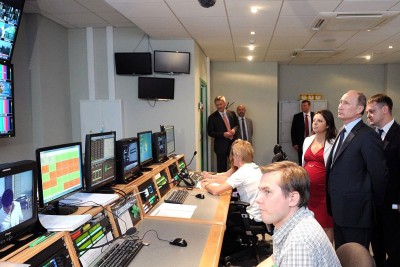Putin's Propaganda TV-Channel Tries to Expand to Austria
An attempt to supply an Austrian target group with German-language propaganda from Berlin will apparently fall victim to the media war between the two state broadcasters Russia Today (RT) in Berlin and Deutsche Welle (DW) in Moscow.
 Vladimir Putin's visit to the Russia Today broadcasting centre in Moscow in 2013. / Picture: © Wikimedia Commons / Kremlin.ru, CC BY 3.0
Vladimir Putin's visit to the Russia Today broadcasting centre in Moscow in 2013. / Picture: © Wikimedia Commons / Kremlin.ru, CC BY 3.0 

What is the Russian state broadcaster Russia Today (RT) and what does it do?
RT DE, a German-language programming service based in Berlin-Adlershof, has been in existence since 2014.
So far, the Kremlin-funded service has only produced content for the Internet. Now it wanted to launch a TV channel
On December 16, 2021, Russian state broadcaster RT - Russia Today announced that the "newest 24/7 news channel of the global news network RT, "RT DE," will go on air for the first time from Berlin."
"The channel is intended to round out the available range of news in the German language and expand the spectrum of opinion. RT DE reports on local, regional, national and international events that are particularly significant for the German-speaking countries (Germany, Austria, Switzerland)."
"The channel and its digital platforms offer the kind of newscasts RT is known for to viewers who want to know more. The focus is on topics and perspectives that are often underrepresented in other German-language news formats. It produces a mix of live newscasts, debates, award-winning documentaries and its own programs. RT DE broadcasts a wide range of programs produced in Moscow and Berlin, bringing award-winning programs from the multilingual global RT network to German-language viewers for the first time."
Further, the channel stated that "RT DE's programming can be received throughout Europe and targets countries with large German-speaking audiences. In Germany, Austria and Switzerland, RT DE can be received on various channels, including satellite broadcast, online and on social media platforms."
RT DE "would have found that German-speaking users are showing a growing interest in RT, and are now pleased that users can not only read our content online, but also watch it on TV. Our viewers are also interested in modern Russia and what it looks like from the inside. They can learn about that from us as well," promised Managing Director of RT DE Productions Dinara Toktosunova.
At the same time, the editorial team was looking for reinforcements in a sympathetic way. "And even though we come from cold Russia, there is an open and friendly working atmosphere in the editorial office. By the way, if your Russian stops at "Babushka" and "Perestroika", this is perfectly sufficient: the reporting is done by an international and ambitious team that communicates in English and German. We place particular emphasis on creativity and initiative - these are at the same time the prerequisites for your career jump with us."
As reported by Vindobona, some well-known former Austrian politicians work for Russian companies. For instance, former Foreign Minister Karin Kneissl has been a board member of Russian state oil company Rosneft since March 2021. In addition, she writes a regular column for RT. In her recent article she compares western interference in Russian politics during the Bolshevik Revolution with that in the Ukrania crisis. "The Bolshevik Revolution and the Ukraine crisis: What can they possibly have in common?" "Western interference in Russian politics has a long tradition. Lenin’s journey in 1917 probably had the greatest impact. And, 105 years later, an explosive mixture of word salad in the news and military machinery is overshadowing an eastern front that has been built up by the media."
RT is a foreign television program founded and financed by the Russian state in 2005.
Until 2009, the channel was called Russia Today. Then the name was changed and the word Russia was removed from the name. This was done to reach a larger audience, especially in the United States. The logo was also changed to RT to attract more viewers "who didn't just want to watch news about Russia all day".
The program, which is broadcast on the Internet and via satellite transponders, claims to present the audience with a "Russian perspective" on international events and to act as a counterweight to "Western media.
The Russian state-controlled television network RT employs over 2,000 media professionals worldwide. Its headquarters are in Moscow. Together with Ruptly GmbH in Berlin (a Russian video news agency specializing in video-on-demand) and Sputnik, it is part of the Rossiya Sevodnya media company.
The five-language program includes news formats, talk shows, debates and documentaries. It broadcasts via satellite in English, German, Arabic, Spanish and French. The program is not identical in the respective languages.
Furthermore, content is offered via the Internet:News portals, channels on YouTube (news multi-channel network on channels in Arabic, Chinese, German, English, French, Spanish and Russian) and Facebook pages. News portals, channels on YouTube (news multi-channel network on channels in Arabic, Chinese, German, English, French, Spanish and Russian) and Facebook pages.
Critics, however, consider the channel a foreign propaganda channel of the Russian government. It is accused of targeted disinformation, such as spreading conspiracy theories. RT's editor-in-chief compared the channel to the "Ministry of Defense," stating that it wages an information war "against the entire Western world.
On February 2, 2022, it was announced that RT would have to cease its German-language TV because German media regulators demanded that it cease its German-language TV programming. Specifically, the competent Commission for Licensing and Supervision at the media institutions objected to and prohibited the broadcasting and distribution of the RT DE TV program in Germany.
Thus, the reason given by the German media regulator was that the required media law license for such a program was not available. No license had been applied for. TV providers, however, need a broadcasting license for nationwide programs in Germany.
YouTube also blocked the corresponding channel on its platform shortly after the start of broadcasting in December, citing community guidelines. A few days later, satellite operator Eutelsat also stopped satellite broadcasting.
RT invoked a Serbian broadcasting license, which supposedly allows it to broadcast EU-wide.
German media regulators, on the other hand, are of the opinion that RT DE's broadcaster cannot invoke any other permission that is legitimate under European law. RT can seek judicial review of the media regulators' decision.
What is the German state broadcaster Deutsche Welle (DW) and what does it do?
On February 4, 2022, German state broadcaster DW - Deutsche Welle reported the closure of its Moscow bureau.
The Moscow team had stopped working after its accreditation was revoked. According to the Russian Foreign Ministry, Deutsche Welle Moscow has about twenty employees, most of whom are Russians. A spokeswoman for the German Foreign Ministry said that the government was very aware of the concerns DW's employees in Russia were facing.
The Russian measures against DW are completely unfounded and contradict freedom of the press, the German government announced, and has called on Russia to withdraw the broadcasting ban. A German government spokesman also issued an urgent appeal to the Russian side not to misuse the problems surrounding the licensing of the Russian broadcaster RT DE in Germany to restrict press freedom.
Russland schließt Büro der #DeutscheWelle in Moskau: Eine Retourkutsche für RT Deutsch. Nur: RT ist ein Propagandasender, wie sich gerad in der Pandemie gezeigt hat.Die KollegInnen der @DeutscheWelle hingegen haben gute, integre und wichtige journalistische Arbeit gemacht.
— Alice Bota (@AliceBota) February 3, 2022
The European Union also condemned the broadcasting ban
"The decision by the Russian authorities to ban the German public service broadcaster Deutsche Welle from broadcasting in Russia, revoke the accreditation of its employees, suggest to consider designating it as a ”foreign agent” and close its office in Moscow, is unacceptable and lacks any justification."
"The German regulator’s decision to ban the Russian state broadcaster RT DE from operating in the country due to the absence of a valid licence is entirely unrelated to the work of Deutsche Welle in Russia."
"The reaction of the Russian authorities regrettably illustrates yet again their continuous violations of media freedom and disregard for independence of the media."
"We stand in solidarity with Deutsche Welle and its personnel in Russia and will continue to follow the situation. We expect that Deutsche Welle will have full and fair access to legal steps in order to challenge this unjustified decision."
Whether the closure of the Deutsche Welle office in Moscow is related to the closure of RT in Berlin in terms of content and timing can only be assumed.
After RT DE was banned from broadcasting its German-language program due to the lack of a media law license, Russia in fact announced "retaliatory measures" the following day, which may already have taken place.
What is the U.S. experience with RT?
Similar experiences with RT in the USA, e.g. in the context of a disinformation campaign about Ukraine and with the Russian interference in the 2016 United States elections were made by the Department of State.
The United States Department of State planned to use a unit formed with the intention of combating disinformation from the Russian government, but it was disbanded in September 2015 after department heads missed the scope of propaganda before the 2016 U.S. election. It would have been titled the Counter-Disinformation Team. It was created under the Bureau of International Information Programs. Work began in 2014, with the intention of countering propaganda from Russian sources such as RT. However the Obama Administration decided to cancel the unit, as they were afraid of antagonizing Russia. A State Department representative said after being contacted regarding the closure of the unit, that the U.S. was disturbed by propaganda from Russia, and the strongest defense was sincere communication. The U.S. Undersecretary of State for Public Diplomacy was the point person for the unit before it was canceled. He had written in 2014 that RT was engaged in a disinformation campaign about Ukraine.
In an August 2020 report, the Global Engagement Center outlined the five pillars of Russia’s disinformation and propaganda ecosystem.
RT (and Sputnik) are key state-funded and directed global messengers within this ecosystem, using the guise of conventional international media outlets to provide disinformation and propaganda support for the Kremlin’s foreign policy objectives.
They also interact with other pillars of the ecosystem by amplifying content from Kremlin and Kremlin-aligned proxy sites (some of which are connected to Russian intelligence), weaponizing social media, and promoting cyber-enabled disinformation.
RT and Sputnik’s role as disinformation and propaganda outlets is most obvious when they report on issues of political importance to the Kremlin.
A prevalent example is Russia’s use of RT to attempt to change public opinions about Ukraine in Europe, the United States, and as far away as Latin America.
When factual reporting on major foreign policy priorities is not favorable, Russia uses state-funded international media outlets to inject pro-Kremlin disinformation and propaganda into the information environment.
Summary
Russian state-funded and state-directed media outlets, such as RT, are critical elements in Russia’s disinformation and propaganda ecosystem.
Apparently, RT DE has been looking for employees and contacts from Berlin to develop the Austrian market.
Shortly after the program's launch, the German media regulator demanded that the TV program be discontinued due to a lack of authorization under media law. The decision of the German authorities will probably be reviewed in court.
Russia threatened consequences for German media and their correspondents in Moscow. In return, Russia withdrew the accreditation of Deutsche Welle staff in Moscow the following day.
The decision by the Russian authorities to ban the public service broadcaster Deutsche Welle from broadcasting in Russia, revoke the accreditation of its employees, suggest to consider designating it as a ”foreign agent” and close its office in Moscow, is unacceptable and lacks any justification.
https://en.wikipedia.org/wiki/RT_(TV_network)



